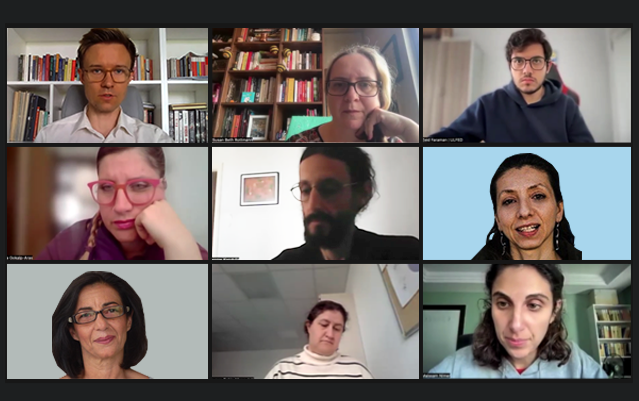WP7 Team Holds Workshop on Migrants’ Voices on Return: Key Insights and Policy Implications
Screenshot from the WP7 Team workshop on Migrants’ Voices on Return: Key Insights and Policy Implications, featuring discussions on key findings and policy recommendations.
On March 21, 2025, the WP7 team, led by Susan Beth Rottmann and Maissam Nimer, held an online workshop to finalize the WP7 comparative report on migrants’ voices on return. The session brought together researchers and representatives from migrant organizations to review key findings, address remaining gaps, and shape policy recommendations. The insights from the workshop will contribute to the final WP7 deliverable—a policy brief that aligns with ongoing policy discussions on return migration.
Key Discussion Points:
Diverse Migrant Experiences and Return Considerations: Participants emphasized that return migration is not a uniform experience. Migrants from different backgrounds face unique challenges but most perceive return as unthinkable, particularly when linked to political and economic insecurity, lack of pension rights, or experiences of injustice.
Psychological and Structural Barriers to Return: The discussion highlighted the psychological burden associated with return, including fear of failure and social stigma. Migration policies often fail to account for these complex, individual decisions, instead focusing on broad deterrence measures that may push migrants toward onward migration rather than voluntary return.
Impact of Policy and Reception Conditions: The workshop participants stressed that return cannot be examined in isolation from broader migration policies. Reception policies in host countries significantly impact return decisions. Policy recommendations should not only focus on return facilitation but also on the conditions that influence migrants’ long-term integration or exclusion.
Diaspora’s Role in Migration Dynamics: Contrary to existing literature that often frames diaspora communities as pull factors supporting return, discussions revealed that in some cases—such as among migrant groups in Germany—diaspora networks can act as a deterrent to return. Migrants may distance themselves from their own communities to avoid stigmatization or negative experiences.
Pushbacks and Policy Implications: While not a central focus of the report, pushbacks were discussed as a normalized yet illegal practice in migrants’ experiences. The team considered including a comment on this issue to highlight its implications.
Policy Recommendations and the EU Context: The workshop underscored the need for policy recommendations to align with ongoing EU discussions on return, particularly regarding return hubs and cooperation with third countries. Participants noted that current return policies, including AVRR (Assisted Voluntary Return and Reintegration), often fail to convince migrants to return voluntarily. Instead, restrictive measures are perceived as injustices that contradict EU values, leading to increased onward migration rather than return.
Shifting the Focus to Migrant Agency: A key takeaway was the importance of centering migrant aspirations and agency in return migration discussions. Policies should be developed with a deeper understanding of migrants' perceptions and lived experiences rather than being designed solely from an enforcement perspective.
The workshop marked a significant step toward refining the WP7 comparative report and shaping evidence-based recommendations for policymakers. By incorporating diverse perspectives, the final policy brief will aim to contribute to a more nuanced and humane approach to return migration governance.
Contact:
Maissam Nimer | Özyegin University (OZU) | msnimer@gmail.com

